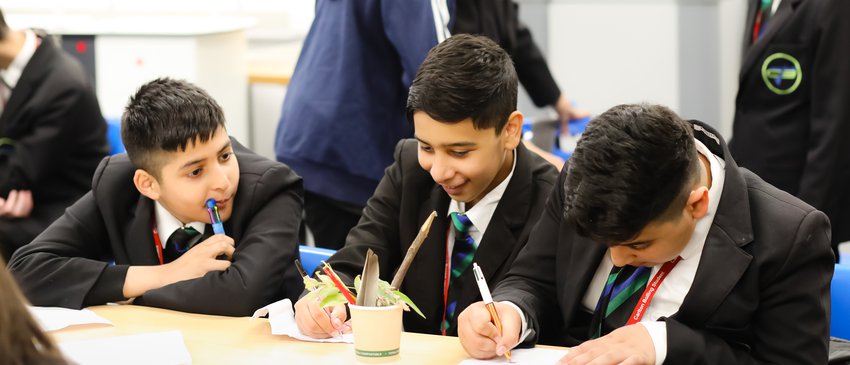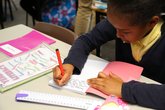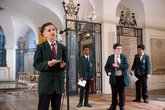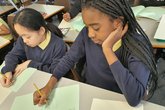Young Writers

Our evidence-based Young Writers programme offers a solution to schools that seek to develop lasting writing-for-enjoyment practices. Believing that every young person is a writer, our programme uses a three-pillar model that emphasises the importance of memorable experiences, working with professional authors and providing a real audience and purpose for writing.
The programme prioritises agency, empowering pupils to choose what they write about and the format they write in. Pupils who take part in Young Writers feel more confident in their writing abilities, enjoy writing more, and see writing for enjoyment more positively. Teachers recognise the impact of different Young Writers projects, and how the different pedagogical elements inspire pupils to write for enjoyment in a way that also meets national curriculum requirements for writing.
If you have any questions please email young.writers@literacytrust.org.uk
Programmes
Visit the programme pages and complete our expression of interest forms to get involved!
-
Created by National Poetry Centre in partnership National Literacy Trust, and supported by Poet Laureate Simon Armitage, the Young Poet Laureate Programme provides children...Learn more
-
An exciting project for Bradford primary schools focusing on the development of writing as pupils move from Year 2 through to Year 4.Learn more
-
Bring the energy of contemporary poetry to your classroom with a our free poetry resources and inspire your students to become the next West Yorkshire Young Poet Laureate.Learn more
-
Giving students the opportunity to visit iconic cultural venues in their local area as inspiration for writing their own poems supported by a local professional poet.Learn more
-
Could your students write persuasively about a positive change they would like to see in their local community? The Wicked Writers: Be the Change competition is now closed...Learn more
-
Discover our social action writing programme that empowers young people to share the stories that matter to them with a real audience and to drive change.Learn more
-
A poetry-based programme supporting schools to explore writing as a therapeutic, self-sustaining, and low-cost tool to promote the wellbeing of their young people.Learn more
-
Inspiring the next generation of mystery writers drawing on the thrilling work of Agatha Christie!Learn more
Research
Our research into writing provides a strong evidence base for our writing programmes.
-
This report builds on our previous research exploring children and young people’s writing enjoyment at school and in their free time in early 2024.Learn more about Children and young people’s writing in 2024.
-
This report brings together insights from the various writing programmes that sit within Young Writers to highlight the important role they can play in the lives of children and...Learn more about The Impact of Writing for Enjoyment Programmes.
-
A summary report of how our evidence-based Young Writers programme is supporting schools to develop lasting writing-for-enjoyment practices with the view that every young person is...Learn more about Programmatic approaches to supporting writing for enjoyment.
Celebrating writing
Explore our resources linked to key moments and practices that can be used to celebrate writing for enjoyment in the classroom.
-
The annual celebration of the power of writing creatively, inspiring people of all ages and abilities to try writing for fun and self-expression.Learn more about National Writing Day 2025.
-
National Poetry Day falls on the first Thursday of October each year, and we produce new resources to help you celebrate and explore the focus theme.Learn more about National Poetry Day 2025.
-
Everybody Writes uses four key principles to develop children's writing, providing teachers with original and creative ideas to support writing engagement and enjoyment.Learn more about Everybody Writes.
Featured resources
Classroom resources to get your students writing.
-
Created in partnership with the RSPB the Writing from Nature resources are designed to widen access to, deepen knowledge of, and increase appreciation of the natural world just...Learn more about Writing from Nature: a poetry resource.
-
Writing from Silence is a combination film and writing for enjoyment resource. The film takes pupils on a journey into the past, through an interactive tour of the National Justice...Learn more about Writing from Silence: a film and poetry resource.
-
Melding poetry with drama to help your students to express themselves through writing. Designed for Year 9+Learn more about Monologue Jam.
-
Picture the Poet is a partnership programme with the National Portrait Gallery and poetry organisation, Apples and Snakes.Learn more about Picture the Poet.
-
Students write their own original poems expressing their thoughts on attitudes towards young people in today’s society.Learn more about Write On: poetry slam.
-
A free, fully planned cross-curricular unit of work designed to help teachers empower their Key Stage 2 pupils to understand, critically navigate and report real news.Learn more about NewsWise cross-curricular news literacy resources.
-
Ideas and activities to support your school in using diaries as an introduction to autobiographical writing and as a way of promoting family and community engagement.Learn more about The diary writer’s toolkit.
-
Teaching sequence and resources to run our Comics Rule! writing challenge in your classroom, exploring the exciting world of comics and graphic novels.Learn more about Comics Rule!.
-
Explore the benefits of a classroom inspired by a love of poetry through this presentation and guide to poetic forms.Learn more about A poetry lover's classroom.






















